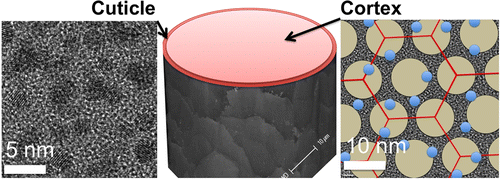
Dans le American Chemical Society News Service Weekly du 5 décembre 2012 :
First synthesis of gold nanoparticles inside human hair for dyeing and much more
Hair Fiber as a Nanoreactor in Controlled Synthesis of Fluorescent Gold Nanoparticles, Nano Letters
In a discovery with applications ranging from hair dyeing to electronic sensors to development of materials with improved properties, scientists are reporting the first synthesis of gold nanoparticles inside human hairs. Their study appears in ACS’ journal Nano Letters.
Philippe Walter and colleagues explain that gold nanoparticles — 40,000-60,000 of which could fit across the width of a human hair — are a hot topic. Scientists are exploring uses, ranging from electronics and sensors to medical diagnostic tests and cancer treatments. Gold nanoparticles have been deposited on hair for use as electrodes, and gold nanoparticles had been used to dye wool. Walter’s team looked at a new use — dyeing hair, inspired by the ancient Greeks’ and Romans’ use of another metal, lead, to color their hair. They describe the first synthesis of fluorescent gold nanoparticles inside human hair. It involved soaking white hairs in a solution of a gold compound. The hairs turned pale yellow and then darkened to a deep brown. Using an electron microscope, the scientists confirmed that the particles were forming inside the hairs’ central core cortex. The color remained even after repeated washings.
The authors acknowledge funding from the Agence Nationale de la Recherche.
Contact Science Inquiries: Michael Woods, Editor, 202-872-6293 General Inquiries: Michael Bernstein, 202-872-6042